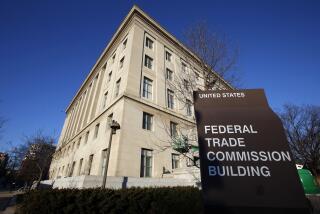Silicon Valley Grouses Over Chip Provision : Computers: GATT accord could include ‘compulsory licensing’ language that would allow other countries to copy technology.
- Share via
SAN FRANCISCO — Despite official satisfaction in Washington over the global trade accord known as GATT, one important U.S. high-tech industry reserved judgment Tuesday because a key issue over intellectual property rights remained unresolved.
Semiconductor makers, many of them based in California’s Silicon Valley, said U.S. trade officials gained ground on their behalf in late negotiating rounds in Geneva. They succeeded in bolstering “anti-dumping” provisions and in getting Europe to agree to reduce tariffs on incoming chips and components, albeit several years from now.
But the industry was still unhappy Tuesday because of a proposed provision nicknamed “compulsory licensing.” As written in 1991 by Arthur Dunkel, former head of the General Agreement on Tariffs and Trade, the provision would allow other governments to legally copy technology and turn it over to companies in their countries for commercialization. The semiconductor industry wants to alter that language to say governments may borrow technology for their own use but not turn it over to the commercial sector. The issue is to be decided today, the deadline for the agreement.
If enacted, the Dunkel language will make U.S. semiconductor makers “fair game,” and all that countries will owe “is a royalty check,” said Michael C. Maibach, a Washington-based lobbyist for Intel Corp., the world’s leading producer of semiconductors. “It wouldn’t make sense to invest in R&D; (research and development) if a foreign government can take it for a penny on the dollar.”
The U.S. industry’s trade concerns come against the somewhat awkward backdrop of preliminary data indicating the sector’s global dominance.
Dataquest Inc., a San Jose research firm, reported Tuesday that, as expected, the United States in 1993 surpassed Japan in dollar sales of semiconductors for the first time in eight years. U.S. companies controlled 41.9% of the global market, narrowly edging Japan’s 41.4% share, according to preliminary data.
However, Dataquest analyst Jim Handy noted, “This is a change, not a trend.”
He noted that two factors have helped the once-troubled U.S. industry regain its edge in semiconductors, the chips of silicon that add intelligence to computers, microwave ovens, autos and other machines.
Japan’s recession has sent sales of consumer electronics--the biggest market for Japanese semiconductors--plummeting. Meanwhile, the personal computer business--the biggest outlet for products from U.S. leaders such as Intel--has been booming.
Handy predicts that economic recovery in Japan--with a hotter market for televisions and other consumer products--could cause the balance to “flip-flop over to Japan again.” But G. Dan Hutcheson, president of VLSI Research Inc., another San Jose research firm, predicts that Japan could slip into third place, behind Korea.







